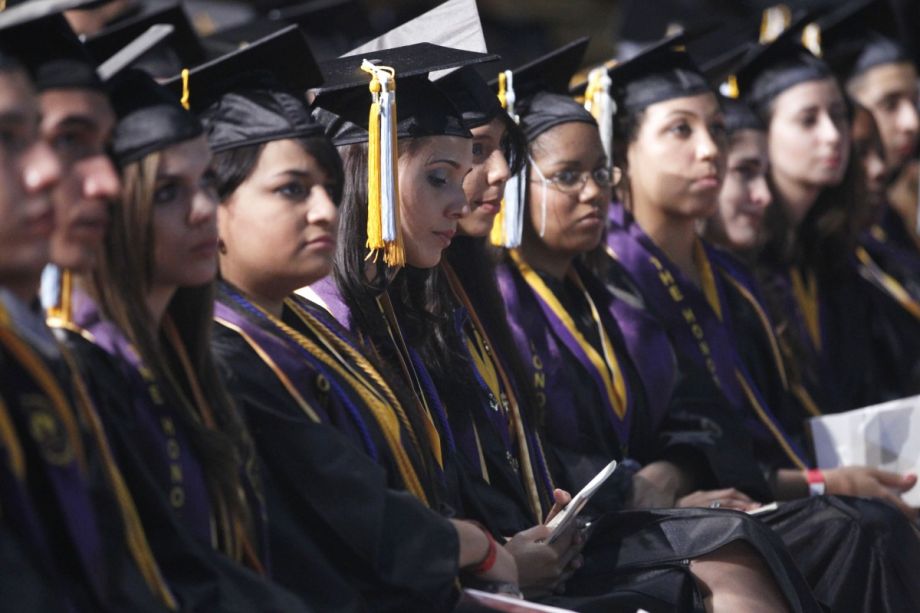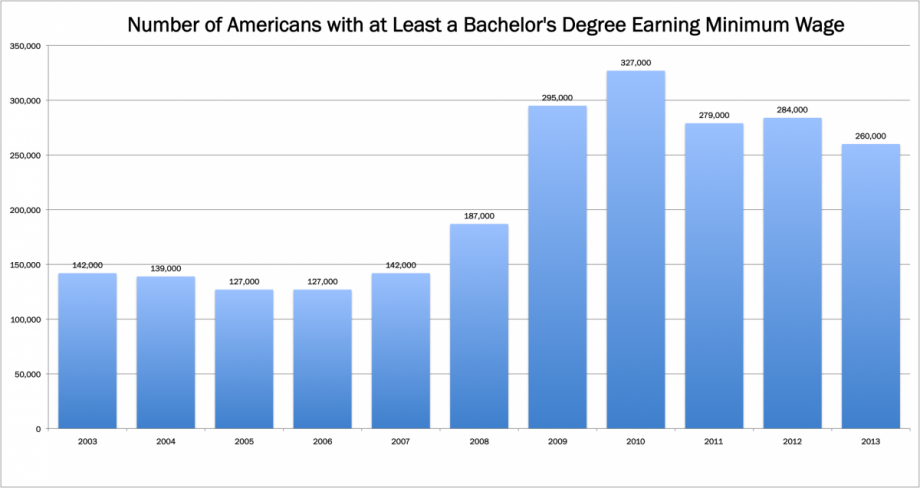The face of minimum wage is changing. It’s no longer just a pimply kid working a summer job at the putt-putt course or a college student answering phones to pay bar tabs. It’s college graduates and parents trying to make ends meet. Last year, 260,000 Americans with a bachelor’s degree or higher worked for the federal minimum wage or less, nearly 120,000 more people than a decade prior, according to new data from the Bureau of Labor Statistics.
Another 200,000 of the nation’s minimum-wage workers held associate degrees, bringing the total number of Americans with college degrees who earned $7.25 an hour or less to 460,000. The report’s numbers did not include minimum-wage workers in states like New York, New Jersey, Oregon or California, where the lowest hourly pay is $8 or more.
“I hear this myth all the time that it’s teenagers working after-school jobs for extra spending money,” Heidi Shierholz, a labor market economist at the Economic Policy Institute, told me. “That it’s not people really depending on the earnings to make ends meet, so there’s no need to raise their wages.”
President Obama has advocated for raising the minimum wage to $10.10. And while the Congressional Budget Office (CBO) found conflicting answers on how raising it might impact the economy, Shierholz emphasized how it could affect the lives of working Americans. “Right now, if you increased the minimum wage to $10.10, the average age of the person who would see a raise is 35,” she said. “These are not kids.”
The number of Americans with at least a bachelor’s degree making minimum wage has dropped from its post-recession high watermark (327,000 in 2010), but it’s still drastically higher than it was before the economy bottomed out, as the chart below shows.
Why are so many Americans who have paid dearly for post-secondary education working for the minimum wage? It’s what experts call “cyclical downgrade.”
“When you’re in a period where the job opportunities are really weak,” Shierholz explained, “job seekers often don’t get as good of a job as they would if they were in this sort of happy universe where job opportunities are strong — because there’s just less out there and more competition for each job. So they will take a job that’s slightly below, if they’re able to find one, and you see this downgrading along the whole skills distribution.”
Sarah Audelo — policy director at Generation Progress, the Center for American Progress’ organization that focuses on young Americans — has noticed this trend among Millennials. “If you look at minimum wage earners, Millennials make up about 70 percent,” she said, citing a recent Generation Progress report on minimum wage. “We aren’t just talking teenagers, we’re talking college educated folks in their 20s and early 30s. And, anecdotally from talking to a lot of young people, it’s simply that they are forced to take these minimum wage jobs because there aren’t better high-paying jobs available.”
The president has spent a good deal of time this year pressing for minimum wage increases and while it’s clear that the federal minimum of $7.25 an hour is not enough to support a family, Congress hasn’t moved an inch. Raising the minimum wage to $10.10 would lift 900,000 families out of poverty. It would, the CBO found, increase the income of 16.5 million Americans. Audelo is hopeful that lawmakers in Washington will follow the trends of cities and states implementing a higher minimum wage. “If Congress isn’t going to listen then people are going to go state-by-state and city-by-city until we finally convince our elected officials to pay attention,” she said.
I asked Shierholz if the rise in college graduates working minimum wage jobs and the countless media reports of working families struggling might usher in some change in Washington. Could that hard-earned degree translating to minimum wage resonate in Washington?
“I think this myth has been a sort of key weapon against increasing the minimum wage,” she said. “So to the extent that it gets broken down, I think that could help spur the progress towards an increase.” And though data has shattered this lazy narrative that minimum wage jobs are just for kids — again, over a quarter million college graduates made $7.25 an hour or less last year — Congress seems content with the status quo.
The Equity Factor is made possible with the support of the Surdna Foundation.

Bill Bradley is a writer and reporter living in Brooklyn. His work has appeared in Deadspin, GQ, and Vanity Fair, among others.


















